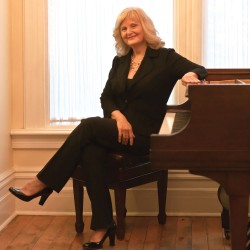 When we contacted Christina Petrowska Quilico early this past summer, she was, no surprise, busy on more than one front. For one thing, she was busy writing program notes for her 26th CD. The CD features two piano concerti written for her, by Heather Schmidt (Piano Concerto No.2) and by George Fiala (Concerto Cantata for piano, opera chorus and chimes). “I gave the world premieres for both pieces” she explained. “And I am stuck on finding a good title so that was what I was working on right now.”
When we contacted Christina Petrowska Quilico early this past summer, she was, no surprise, busy on more than one front. For one thing, she was busy writing program notes for her 26th CD. The CD features two piano concerti written for her, by Heather Schmidt (Piano Concerto No.2) and by George Fiala (Concerto Cantata for piano, opera chorus and chimes). “I gave the world premieres for both pieces” she explained. “And I am stuck on finding a good title so that was what I was working on right now.”
“For another thing,” she said, “I am looking forward to taking one of my daughters to see Alice in Wonderland with the National Ballet of Canada. My daughters and I love the ballet and we have all taken lessons.”
“So no slacking off during the summer?” we asked.
“I am looking forward to working with Christopher House of the Toronto Dance Theatre on a new major project for next April,” she replied. “Rehearsals begin in September but the works starts now. I’m also working with dancer Terrill Maguire from York University on a dance/piano concert for September.”
And that wasn’t all, “This July I’m recording new works by Constantine Caravassilis (the first CD of a 2 CD set). I am practising the Grieg piano concerto to perform with the Kindred Spirits Orchestra November 5 at the Markham Theatre. I will be learning more music by Constantine Caravassilis to record the second CD of his music. I am reviewing my Ann Southam repertoire for several tribute concerts and working on the rest of the Glass Houses and other pieces she wanted me to record.”
And then there is her teaching: “I am a Full Professor at York so my work begins there very soon. I’m Director of Classical Piano and there are a lot of piano students which is extremely encouraging. I have to plan my courses and course kits, audition and do quite a bit of paperwork so that everything runs smoothly.”
Well, the saying goes that if you want something done well, you should always give it to a busy person! So, fast forward three months, and, no surprise, everything on Petrowska Quilico’s list is three months further ahead. As she said, she prefers things to run smoothly.
The dance/concert with Terrill Maguire has been and gone (September 15 to 18). The 26th CD’s program notes are complete, it has a name — Tapestries — and Centrediscs will be launching it in early November. As for the first Constantine Caravassilis CD she was working on, it’s “in the can” and the second is under way.
Caravassilis is a young composer who won the 2009 Karen Kieser Prize in Canadian Music for his work Sappho de Mytilène for mezzo-soprano, flute and piano and subsequently was awarded the first Harry Freeman Prize for young composers, along with Petrowska Quilico, towards this recording project.
Fact is, that in terms of new commissions and performances of contemporary music, there is no greater champion than Petrowska Quilico. This is her fifth CD of Canadian piano concerti (and third concerto CD on Centrediscs) — for a total of eight recorded Canadian piano concerti, two of which had Juno nominations for best composition (Glenn Buhr and Larysa Kuzmenko) and two of which have been, quite literally, “out of this world” — astronaut Steve MacLean took her recording of David Mott’s Eclipse on the space shuttle Atlantis, and her recording of Alexina Louie’s Star-Filled Night on his first mission on the space shuttle Columbia in 1992.
For almost her entire performing career, Petrowska Quilico has championed the music of her time. So it was less of a surprise to find out there are more projects of this type in the wings, including a CD of piano music by Canadians Kati Agocs, Abigail Richardson, and Ana Sokolovic, than it was to hear of the upcoming performance of the Grieg piano concerto with Kindred Spirits in Markham.
It shouldn’t be so surprising, though, if one thinks back on her concert tours, as a soloist and as partner to her late husband, the legendary Metropolitan Opera baritone Louis Quilico. She has toured four continents — been to Taiwan, the Middle East, France, Germany, Greece, Ukraine, throughout the United States and Canada. On the recital stage, she has appeared at such prestigious New York venues as Carnegie Hall, Lincoln Center’s Alice Tully Hall, and Merkin Concert Hall.
She is at home with many other musical periods — particularly the romantics and early 20th century composers. Among her over two dozen recordings are Romantic Gems, which includes works by Clara Schumann, Fanny Mendelssohn, Amy Beach, Granados, Janacek and Rachmaninoff; a Chopin and Liszt CD, and another of Debussy. And with Louis Quilico, she recorded four CDs — of French and Russian songs, and of recitals of arias, art songs and show tunes.
In a nice turn of phrase the Toronto Star’s William Littler called her an “astonishing pianist … particularly gifted as an interpreter of the language of the moderns like Stockhausen and Messiaen ... who can [also] control the Niagara of sound in a great Chopin Polonaise.”
When it comes to breadth of repertoire, technical facility and interpretive prowess, few pianists can match her. Trained from an early age in the demanding Russian tradition, she can wrap herself around repertoire from Bach to Boulez and beyond. Composer Gyorgy Ligeti called her “one of the absolutely best young pianists” when he first heard her, and in 2002, when Pierre Boulez was in Toronto to receive the Glenn Gould Prize, he coached Petrowska Quilico only hours before she was to perform his Première Sonate on a live national broadcast. As the story goes, even though she had meticulously followed his own metronome markings, he exhorted her to “Play faster, play faster” — so she did, to his great satisfaction. That energetic performance is preserved on her Ings CD.
Of all the performing and recording that she is doing, though, one still senses that her dedication to the work of composer Ann Southam, who died last year, remains central, and there is no doubt that the admiration was reciprocal.
“I didn’t think anyone would play this piece,” Southam once remarked of her work ‘Rivers’ “but when Christina performed it, I loved the sound and what was happening as the hands interacted. And I loved the little tunes and motifs that could be heard in the interaction between the hands. It takes a whiz-bang pianist to make those heard. I don’t know how she does it!”
And Petrowska Quilico wrote a piece for The WholeNote after Southam’s passing in which she quoted Schoenberg’s comment “that there was still great music to be written in C” and that Ann Southam proved him right, “cheerfully hunting for Middle C — and in doing so [having] a disconcerting way of reinterpreting familiar forms and techniques.” And of Southam’s “continuing to use a 12 tone row and spin it out, one note at a time for 20 years,” Petrowska Quilico observed: “Ann hoped she could bring some tonal sense to the serial technique. It may be called “minimal,” but her works embroider the layers of tonal fabric created through the serial row — weaving, in fact, in a manner that reflects traditional women’s work.”
Interestingly, Petrowska Quilico sees in Southam something of the tradition of Chopin and Liszt. “Her pieces are characterized by a flow and energy produced by rhythmic cycles that repeat within interchanging melodic motifs. Her slow music suspends our sense of time, while the fast pieces, with their undercurrent of recklessness, become hypnotic and surprisingly tranquil and reflective. Although maintaining an angular tone row, both extremes reveal a serene lyricism that is a common thread in her music.”
Petrowska Quilico’s performances of Ann Southam’s music continue. In October, she is performing Southam’s “Rivers” in three concerts — first in early October at the 2011 Contemporary Music Festival at James Madison University in Harrisonburg, Virginia, followed by excerpts as part of an Arraymusic tribute to Southam on October 14 at Gallery 345, and, again excerpts, in a Celebration of Women Composers at the Heliconian Hall on October 28.
Not only a versatile performer, Petrowska Quilico is also a valued teacher. At 20 years old, she began teaching at the Paris American Academy, focusing on the music of the 20th century Viennese school of Schoenberg, Webern and Berg. Since that early start, she has been on the faculty of the Royal Conservatory in Toronto, and both Carleton and Ottawa Universities. While in Ottawa, she was director of the new music group Espace Musique for five years and music director of Opera Lyra for its first year.
If teachers are shaped by their own teachers, then Petrowska Quilico had a head start. One of her first teachers was the “revered but exacting” Russian-born pedagogue Boris Berlin at the Royal Conservatory of Music in Toronto. Besides demanding equal technical facility with both hands, Berlin opened Petrowska Quilico’s ears to new music, refusing to let her study a Chopin concerto unless she learned a new Canadian work as well. Through hours of practice and her mother’s encouragement, she grew attached to the piece. When she received her ARCT at the Conservatory, Berlin recommended her for a scholarship to Juilliard. (She also managed to emerge from Juilliard with a degree in science as well as music, but that is a story for another day.)
In 1987, Petrowska Quilico joined the faculty in the Music Department at York University in Toronto, where she remains to this day, a tenured Full Professor of Piano and Musicology. She is also Director of Classical Piano and a member of the Graduate Faculty, in which she continues to teach and supervise Masters and PhD students. As her curriculum vitae puts it, “primarily an exponent of the Russian tradition — with training in baroque, classical, romantic and contemporary, and experience as a soloist, chamber musician and accompanist — she adds her vast knowledge gleaned from working with diverse composers, and her personal insights from years of study and extra-musical pursuits.”
Another story goes that just as she was entering university, Petrowska Quilico had a poem printed in the New York Times, published an entire book of poetry, and seriously considered writing as a career. As she asserts, “I didn’t want to be just a pianist, or to give up the writing.” She has continued writing over the years, as well as painting. And if there is anything such a “just a pianist” Christina Petrowska Quilico is certainly not it.



